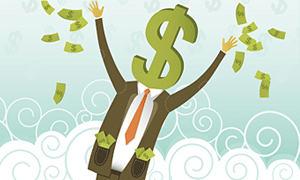
Did you recently get a bonus, an inheritance or similar “money gift” that is turning the pupils of your eyes into giant dollar signs? Hey, who DOESN’T get “visions of sugarplums” when pondering the potential possibilities of big chunks of money?
For most of us, splurging at least some of it is a good idea. But the wisest course for most of a windfall is to think of it NOT as a windfall but rather a “jump-start” on getting your finances in shape for your retirement future. Specifically, most of us should take care of our short-term money obligations and put the rest of the stash to work on our long-term needs.
Here’s a five-step suggested “to-do” list:
1. Make sure your windfall’s “eggs aren’t in one basket.” Sometimes an inheritance can come in the form of stocks that are 100% invested all one company, or perhaps one sector, such as high-tech. Needless to say, that’s a risky bet if that company goes out of business or that sector slumps to the dumps over the long-term. Your portfolio will be in better shape if it’s diversified, or spread among different investments. You might want to consider an index fund that invests in the “broad market” such as the S&P 500.
2. Create an emergency stash if you don’t have one already: One rule of thumb is to bank the equivalent of four months of your household salary to use for emergencies or for unforeseen expenses. This money should be in a short-term investment, not a stock mutual fund that is subject to market “mood swings.” We recommend putting this money in certificates of deposit (CDs) rather than a money market account, which is really a fancy name for a bank account. Even though CDs carry a pre-payment penalty for early withdrawal, the superior interest rate to a money market account usually makes it worthwhile.
3. Plan to use part of the money to pay off credit card debt, if applicable. Why? Because you’ll be getting rid of interest that you’re paying somebody else—therefore making your money work harder for you. What’s more, by dumping this debt you may wind up paying less for credit in the future if you need it. That’s because you could improve your credit rating, which makes you a good “credit risk” and therefore lowers the interest rate you are charged on unpaid balances.
4. Are you a homeowner yet? If not, create a “down-payment savings account.” A home isn’t just a roof over your head, it’s one of your most important retirement investments because, just like the investments in your 401(k) account, you very likely will profit by selling your home for more than you paid for it when you retire. A big down payment can be a win-win because a) it means a smaller mortgage and therefore lower monthly mortgage payments and b) it may mean the mortgage lender will qualify you for a fixed-rate rather than an adjustable-rate mortgage. A fixed-rate mortgage helps you avoid the risk of having your mortgage payments go up when interest rates do. Where to invest this “down-payment account”? Again, CDs are probably the best place to stash the money depending on how long it will take you to save up for a down-payment.
5. Already a homeowner? Put your stash to work for your retirement in a Roth IRA. The advantages are that while contributions aren’t tax deductible as they are to a “regular IRA,” you don’t pay any income taxes when you have retired, and it’s no fun to pay taxes when you’re living on a fixed income (you do pay capital gains tax on investment returns but this is usually a much lower rate than your income tax rate). Unfortunately, like just about everything else involving the IRS, there are limits on how much you can contribute to a Roth IRA—and whether you can contribute at all because the IRS thinks that you “earn too much money” (right).
Income limits on Roth IRAs for 2008: to qualify for the maximum IRA contribution, married taxpayers filing a joint return must have an AGI (adjusted gross income) of less than $156,000; the income ceiling for singles is less than $99,000.
Contribution limits on Roth IRAs for 2008: The contribution limits for couples under the age of 50 is $10,000 and $5,000 for singles.


